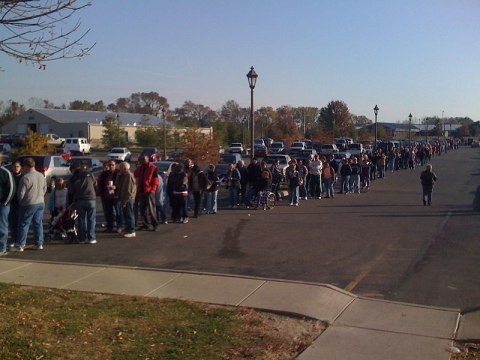“Golden Week” Not So Golden This Year

by: Brittany G. Crouch
Since 2005, Ohio voters have enjoyed particular early voting opportunities, such as evening and Sunday hours, in addition to a unique week in which voters could register and vote on the same day, commonly known as “Golden Week.” This tradition continued until earlier this year, when a combination of Ohio Senate Bill 238 and a directive from Secretary of State Jon Husted eliminated Golden Week and cut some evening and Sunday hours when voters could cast their ballots. Under the new law, Ohio provided only 28, instead of 35, early voting days.
In response to these cuts, the NAACP and the ACLU, among others, brought suit against the Secretary of State to have early voting opportunities restored. On September 4, a federal judge ruled that the cuts to early voting violated the U.S. Constitution and the federal Voting Rights Act, and that the state must restore Golden Week (along with the evening and Sunday hours) in time for the upcoming November election. On September 24, a unanimous three-judge panel of the U.S. Court of Appeals upheld that ruling, seemingly solidifying Golden Week’s return.
A last-minute decision by the U.S. Supreme Court, however, halted the ruling. On September 29, in a 5-4 decision, the Supreme Court issued a stay of the Court of Appeals’ ruling, meaning that Golden Week and other early voting hours were not reinstated for this year’s elections.
Why is Golden Week such a pain in the side of the State of Ohio?
Those who opposed retaining Golden Week attribute their stance to the fight against voter fraud and cost. The State claims that the purpose of a registration deadline is to verify a voter’s identity before voting. It asserts that when registration occurs simultaneously with voting, there is no time to confirm the identity and residence of the voter. It argues additionally that allowing these early voting times increases the costs and administrative burdens on state election administration, such as extra staffing that would be necessary to accommodate the early voters.
Why is losing Golden Week putting Rights-Activist groups into a frenzy?
Those in favor of retaining Golden Week and the evening and Sunday voting hours were concerned about voters who relied on these additional early voting opportunities. They believe that this cutback in early voting will affect a disproportionate number of low-income voters who rely on those extra hours because the voters cannot afford to take time off work during regular business hours. They also claim, through statistical analyses, that the early voting cuts specifically affect African-Americans, because those voters have historically taken advantage of these opportunities in the past decade more than most other voters. In particular, African-American churches in Ohio use “Souls to the Polls” programs to help bring voters to early voting sites after Sunday church.
The opportunity for early voting in Ohio is settled for this election cycle: voters could vote early only during the reduced 28 days and could not take advantage of Golden Week. Now the Supreme Court must decide whether or not it will hear this case on the merits—if it does, the stay will remain in effect until a decision is rendered; if it does not, the stay will terminate immediately and the state will have to reinstate extra early voting and Golden Week for the next election cycle.
What does this mean for the 2014 elections in Ohio, particularly in close races such as the gubernatorial and Secretary of State elections? Those voters who otherwise would have taken advantage of the expanded voting opportunities – such as many African-American voters – needed to find another time to vote. And historically those who took advantage of early voting in previous years tended to skew Democratic. It remains to be seen whether this fact will have a tangible effect on the election outcomes this year, but it is one factor to watch.
